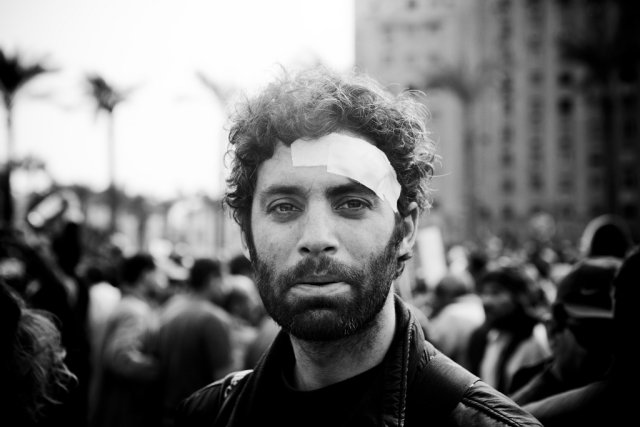
Global politics has taken a dramatic turn this year with the uprisings in the Arab world successfully overthrowing dictatorial regimes, and inspiring democracy movements in countries throughout the region.
People who are fed up with corruption, repression and low living standards have stood up and fought for their rights and won many gains. What the movements in the Arab world have shown the people of the world is that no matter how strong governments are, people united in struggle can defeat them.
In Tunisia, the US-backed dictator Zine El Abidine Ben Ali was overthrown, a movement in part inspired by revelations about the corrupt regime published by WikiLeaks.
In Egypt, millions of people — facing mass repression and pro-government thugs — continued to mobilise until they achieved their goal: the removal of dictator Hosni Mubarak.
Egyptians have since fought to rid the new government of all corrupt and undemocratic elements. Since the fall of Mubarak, democratic movements have intensified in Bahrain, Syria, Yemen, Libya, Algeria, Morocco and Oman.
The whole Middle East is in revolt and it is people power that is driving the process.
In Europe, governments have implemented harsh austerity measures to make ordinary people bear the costs of the economic crisis. But again they have faced strong resistance.
There have been mass student and union protests in Britain and huge strikes in France and Greece. Meanwhile, the governments in Venezuela, Bolivia and Cuba provide proof that people and the environment can come before profit.
In Australia, Prime Minister Julia Gillard’s government has pursued the same right-wing agenda that saw the Labor Party almost lose the federal election.
The government has refused to take serious action on climate change, it continues to lock up refugees in increasing numbers and has maintained the racist Northern Territory intervention.
But people throughout the country haven’t taken this sitting down. Thousands have rallied for equal marriage rights, reflecting the fact that most Australians support it.
People throughout the country also responded to Gillard’s attempts to demonise WikiLeaks and Julian Assange. Gillard’s efforts failed and Assange remained a more popular figure than her.
It is clear on most of the big issues the Gillard government is not acting in the public interest, nor representing most Australians.
To restore this imbalance, we need to develop the type of people power movements that will ensure governments must respond to the will of the people.
All of these issues will be discussed at the Resistance conference, which will be held at the Redfern Community Centre in Sydney over May 6-8.
The conference will be joined by international guests including Matthew Cassel, former assistant editor of Electronic Intifada and now a freelance journalist and photographer.
Cassel recently reported from Egypt, where he witnessed the revolutionary upsurge that toppled the Mubarak dictatorship and continues to reshape the region. He will speak about his experiences there and what role alternative media can play in bringing about a more just world.
Also speaking will be Heleyni Pratley, an organiser for the Unite Union in Wellington, New Zealand/Aotearoa.
Unite is a union that mostly organises young people who work in low-paid jobs at companies such as JB Hi-Fi, McDonald's, Starbucks, KFC and call centres. She will discuss how young people can get active in unions and the importance of organising young workers in traditionally non-unionised workplaces.
The secretary of the Socialist Party of Malaysia (PSM) Youth, Santhana Devi, will also be speaking. The PSM works with plantation workers, the urban poor, industrial workers and peasants to fight for their rights throughout Malaysia. She will provide a perspective on what it is like to build a socialist alternative in a country with severe poverty.
Many Australian guest speakers will also be contributing to the conference, such as Antony Loewenstein, a Sydney-based independent journalist and author of My Israel Question. He is currently working on a book about disaster capitalism in Australia, the Asia-Pacific and beyond.
Kate Ausburn, a journalist and Resistance member who has written extensively for Green Left Weekly about WikiLeaks and Bradley Manning, will talk about the global political impact of WikiLeaks and the incarceration of Manning.
John Thomson, president of the Lock The Gate Alliance, will also speak. Thomson works with individuals, communities, industry, professionals and environmental groups to educate people about the serious impacts of coal mining and coal seam gas mining.
The conference will begin on May 6 with a public forum featuring Cassel, Ausburn and Loewenstein. Titled ‘Confronting the Empire’ it will focus on the revolution in Egypt, the importance of WikiLeaks and how the uprisings have spread throughout the Arab world.
Over the weekend there will be many forums and workshops on different social justice campaigns. There will also be workshops discussing radical history and theory.
Resistance is a socialist youth organisation that aims to fight injustice today to build a sustainable and just world tomorrow. Alongside the three days’ discussion on ideas to change the world, the conference delegates from Resistance branches across the country will vote on plans for Resistance’s campaigning in 2011.
The conference is open for everyone to attend. To register and see the entire agenda visit www.resistance.org.au/conference2011 .
Comments
Anonymous replied on Permalink